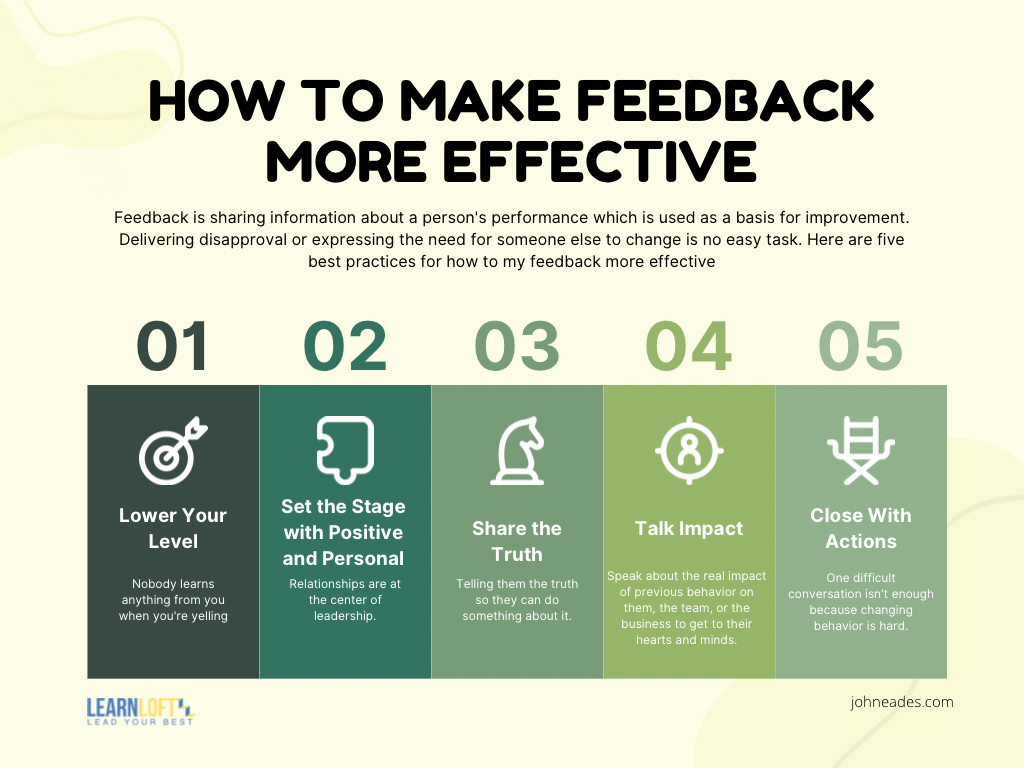Comments
- No comments found

No one, even the most narcissistic bosses, enjoys having difficult conversations.
However, most managers understand giving feedback is a part of their responsibility, but struggle to go down the difficult road.
Feedback is sharing information about a person's performance which is used as a basis for improvement. Delivering disapproval or expressing the need for someone else to change is no easy task. It's always easier to hope the problem goes away on its own or pray the person figures it out without you having to bring it to their attention. Often, neither of those things happen, leaving you uncomfortable and wrestling with feelings of frustration.
In moments like this, it's essential to remember a leadership principle I share in all my coaching conversations:
When uncomfortable, don't listen to your feelings, embrace small actions.
Before I share a few small actions to make a difficult conversation more effortless, we first have to be aligned on two critical ideas on the subject: Accountability is a Skill and Effectiveness Matters More Than the Act.
Being naturally good at having difficult conversations isn't a thing. People are good at accountability because it's a skill they have learned and developed. Unfortunately, most managers have a false sense of belief about their skill level when it comes to accountability and sharing feedback.
On a recent episode of The John Eades Podcast, Matt Hoffman, Head of Talent at M13, said it well, "Just because you are good at one thing doesn't mean you are good at everything."
If more of us took this humble approach and growth mindset to the skills that encapsulate leadership, we would be better leaders.
The effectiveness of any act is important. For example, playing golf is great but playing it well is the optimum outcome. Completing a task at work is excellent, but it is a waste of time if it isn't done well. The same is true when it comes to delivering feedback.
Delivering feedback and effectively getting the desired results are totally different things.
Too many managers or executives think they successfully delivered feedback because they tell a team member something that needs to change. However, too often, their feedback has an inverse effect on their desired intent.
So instead of winging the conversation, embrace the three Ps. "Plan, Practice, Perform." If you need a plan, here is a way to do it.
There is never one perfect way to give feedback since each person and situation is slightly different. So instead of assuming what I am about to share with you is a perfect model, here are some best practices based on research of over 65k leaders and coaching thousands of leaders.

1. Lower Your Level - It's tempting to believe that in order to get your point across and to ensure the other person will take your words seriously, you must raise your voice. While there might be shock value and your emotions feel justified, raising your voice has the inverse effect. Ryan Holiday wrote it well,
"Nobody learns anything from you when you're yelling." - Ryan Holiday
Just because Holiday is correct doesn't mean it's easy.
2. Set the Stage with Something Positive and Personal - It's important to note that this isn't the old feedback sandwich of telling them something good, then something bad, then something good again. However, when you open the conversation with something positive and personal like, "I have seen tremendous effort and progress. Your growth has been a big part of our success in 2022. This is why I am a bit concerned about something I see."
Instead of the boxing gloves coming out, now someone starts with the gloves down and is willing to listen. If that weren't enough, you are demonstrating you care about the person, and like I said in this video, "Relationships are at the center of leadership."
3. Share The Truth (and Allow Response) - There is some reason you are having this conversation in the first place, and now is the time to share the truth. While this seems obvious, we have a truth-sharing problem in the workforce and the world. Leaders are more concerned with upsetting someone or hurting their feelings versus telling them the truth so they can do something about it. It reminds me of the quote: "The truth needs no crutches. If it does, it's a lie."
After sharing the truth, it's essential to remember feedback works best when it's a conversation versus a monologue. There is a chance the truth you believe isn't correct for various reasons.
Feedback works best when it's a conversation versus a monologue.
Use this space to ask questions like, "Is this correct?" "Is this how you see it?"
4. Talk Impact - People create sustainable change once they want to do it. You need to speak about the real impact of previous behavior on them, the team, or the business to get to their hearts and minds. The best way to talk about impact is to answer this question, "what good or bad thing happens if this person does or doesn't change?"
5. Close with Actions - One of the biggest mistakes any leader can make is going through all the work to deliver high-quality feedback without following up and following through on when this change will occur. It doesn't matter who you are or what you have done; one conversation isn't enough.
One difficult conversation isn't enough because changing behavior is hard.
Get a hard commitment on how and when you will follow up and help them move forward.
There is nothing easy about having difficult conversations. However, if you can implement these best practices, you will be shocked at how much more effective you are moving forward.
John is the CEO of LearnLoft, author of, F.M.L. Standing Out & Being a Leader and host of the 'Follow My Lead' Podcast. He writes or has been featured on Inc.com, LinkedIn Pulse, TrainingIndustry.com, eLearningIndustry.com, CNBC Money, and more. John completed his education at the University of Maryland College.
Leave your comments
Post comment as a guest